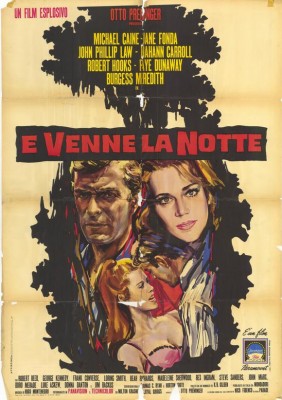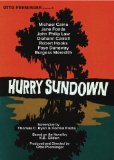| Reviews & Columns |
|
Reviews DVD TV on DVD Blu-ray 4K UHD International DVDs In Theaters Reviews by Studio Video Games Features Collector Series DVDs Easter Egg Database Interviews DVD Talk Radio Feature Articles Columns Anime Talk DVD Savant Horror DVDs The M.O.D. Squad Art House HD Talk Silent DVD
|
DVD Talk Forum |
|
|
| Resources |
|
DVD Price Search Customer Service #'s RCE Info Links |
|
Columns
|
|
|
Hurry Sundown
Henry Warren (Michael Caine), in response to wife Julie Ann's (Jane Fonda) act of saxophone-fellatio
Otto Preminger's terrible Hurry Sundown (1967) gained some notoriety when it appeared in Harry Medved and Randy Dreyfuss's (and Michael Medved, uncredited) The Fifty Worst Films of All Time, the influential 1978 softcover that helped launch the so-bad-it's-good mode of movie-watching. Upon reflection, the authors would probably like to completely revise their book if they could. Not only are obvious favorites like Plan 9 from Outer Space omitted, in the case of Hurry Sundown it's not even Otto Preminger's worst film (most would agree Skidoo wins that honor), let alone truly ranking as one of the 50 all-time worst.
Hurry Sundown is still plenty bad, though disappointingly it's not all that amusingly bad, just tasteless, overwrought, miscast, wildly inauthentic, and overrun with stereotypes of the American South. As one critic put it, it's the bottom of the cracker barrel.
Nevertheless, I'm sure there are plenty of film buffs eager to see it. This reviewer is certainly delighted Olive Films licensed both it and Preminger's much better Such Good Friends (1971) from Paramount's classic film library. The disc is 16:9 enhanced and presented in its original Panavision aspect ratio.
The story is set in Georgia in 1946 though I found this confusing at first. In the opening scenes automobiles from the mid-1960s are clearly visible in the distance, as are television antennae on the tops of various houses. In any case, bigoted draft-dodging landowner Henry Warren (Michael Caine) and his unhappy, racist trophy wife, Julie Ann (Jane Fonda), are ready to celebrate a land deal that will make them filthy rich. Only two plots of as-yet-unpurchased farmland stand in their way. The first belongs to Rad McDowell (John Phillip Law), Henry's dirt-poor cousin, who's just returned from the war and into the arms of his devoted wife, Lou (Faye Dunaway), and their army of barefoot children. The second plot belongs to Julie Ann's former mammy, Rose Scott (Beah Richards), whose sharecropper son Reeve (Robert Hooks) is trying to work the land.
Most of the picture contrasts the unhappy Warren family with the poor-but-happy-if-struggling McDowells and Scotts. Julie Ann's mentally disturbed six-year-old hasn't spoken a word since stepfather Henry tied him up in his crib and abandoned him for the day. The kid screams a lot, usually when Henry and Julie Ann are about to have sex. (His ear-splitting screams are the only authentic thing about the film. Given Preminger's autocratic-sadistic reputation he might not be acting.) Provocateur Preminger is on display in Hurry Sundown's trashy and frequent sexual innuendo, most notoriously when Jane Fonda's Julie Ann turns on Michael Caine's Henry by essentially giving Henry's saxophone a blow-job.
Hurry Sundown makes a bit more sense when you realize Preminger originally conceived the project as a socially relevant melodrama set in the Deep South - Margaret Mitchell meets Harper Lee. Certainly Jane Fonda plays Julie Ann a lot like Scarlett O'Hara while Preminger hired To Kill a Mockingbird's screenwriter, Horton Foote, to adapt Katya and Bert Gilden's cheesy novel. In its early stages, Preminger conceived a four-and-a-half-hour roadshow with reserved-seat tickets as pricey as $25. And that was in 1965-66.
Filming in Louisiana, near the height of the civil rights movement, proved more harrowing than anything in the movie. Locals objected to the interracial socializing of the Hollywood cast and crew (sharing the same hotel swimming pool, etc.), threatening and reportedly even firing upon the unit, who eventually kept to their rooms guarded by armed state troopers.
Unfortunately, Hurry Sundown is itself singularly unreal, as ludicrous as Carol Burnett's celebrated spoof of Gone With the Wind. One look at the racial strife being reported almost daily on the evening news and Hurry Sundown was like a live-action cartoon.
Preminger directed lots of good, envelope-pushing movies that not only broke censorship barriers and addressed cultural taboos but which were also unusual and even daring in their structure and telling, and which explored settings and conflicts generally avoided by mainstream Hollywood. Consider Advise & Consent (1962), Preminger's best film, in which he not only dealt with homosexuality in politics in a frank (if somewhat dated) manner, but also the wheeling and dealing of Congress better than any fiction film before or since. That film was unusual as there was no central protagonist, and several actors were successfully cast against type, including a British actor (Charles Laughton) playing a southerner.
In Hurry Sundown Cockney Caine's attempt at a Georgian accent isn't so bad except that it's Michael Caine, for cryin' out loud, an instant pop icon as the singularly British Alfie and Harry Palmer; it's just hard to accept him playing a Simon Legree-type southerner. Fonda's undone by her ludicrous Southern Belle character; in some scenes she's terrible, but in others not bad. Burgess Meredith's racist judge probably comes off best because he lowers his performance to the level of the material, hamming it up outrageously: the Penguin as Col. Sanders. (Meredith, a Preminger regular, was fine in Advise & Consent, conversely quite subtle in that.)
John Phillip Law's association with Preminger (he's also in Skidoo) probably damaged a promising career. Law was outstanding as the handsome Russian sailor in The Russians Are Coming the Russians Are Coming (1966) but mainly worked in Europe after Preminger's two films. A big courtroom scene near the end features Robert Reed in a kind of amusing flip-flop of his character from The Defenders, while Jim Backus, fresh from Gilligan's Island, is surprisingly good in a straight dramatic turn.
Why absolutely everything went so terribly wrong on Hurry Sundown is impossible to say, except that the project began heading south (so to speak) the moment the novel failed to set the world on fire as Gone With the Wind had. That, coupled with Preminger's fame as an abusive screamer-type, couldn't have helped.
Video & Audio
Filmed in Panavision, Hurry Sundown looks just fine in its 16:9 enhanced 2.35:1 presentation. Though bad in other ways the film was a big production and the literally explosive climax is an eye-opener on big screen TVs. The region 1 disc has no subtitle or alternate audio options, but the English mono track is totally fine. There are no Extra Features.
Parting Thoughts
If it catches one in just the right mood - and that apparently was true of DVD Savant - Hurry Sundown can be fairly entertaining, and it's worth seeing for its cast, but it's neither the unjustly-maligned masterpiece I was hoping for nor the laff-riot I was expecting. As such this is merely Recommended for the morbidly curious.
Stuart Galbraith IV's audio commentary for AnimEigo's Tora-san, a DVD boxed set, is on sale now.
|
| Popular Reviews |
| Sponsored Links |
|
|
| Sponsored Links |
|
|
| Release List | Reviews | Shop | Newsletter | Forum | DVD Giveaways | Blu-Ray | Advertise |
|
Copyright 2024 DVDTalk.com All Rights Reserved. Legal Info, Privacy Policy, Terms of Use,
Manage Preferences,
Your Privacy Choices | |||||||















